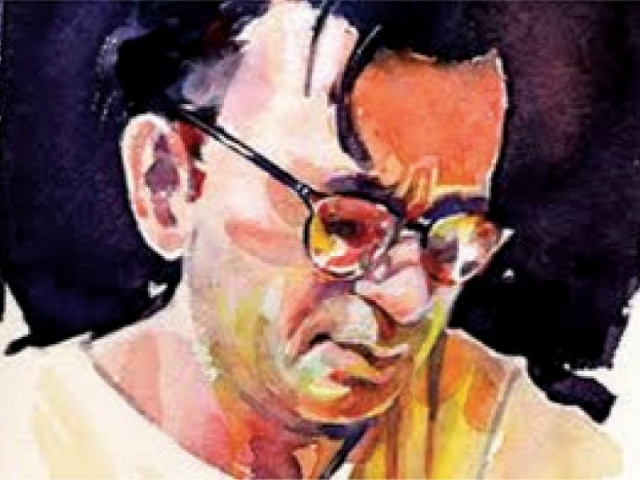Manto centennial: Homage to an oft-misinterpreted writer
Literati and members of English Speaking Union gather for a reading session.

Literati and members of English Speaking Union gather for a reading session.
“Safiya, vekh kuri ayi ay!”
It was 1954 and a young Kishwar Naheed, then a 10th grader and now poet, was standing at the door of Saadat Hasan Manto’s house in Lahore.
Manto — one of the greatest Urdu short story writers of all time — was sitting on a chair with his legs crossed, balancing a writing pad on his knee. He momentarily raised his head; saw Naheed, who was clad in a black burqa at the time, and called his wife, Safiya, to answer the door.
“I was sweating thinking this was the same writer who I had read with admiration and for reading whose works I had even received beatings,” Naheed recalled fondly at a reading session to celebrate Manto’s birth centennial at Kuch Khaas in Islamabad on Wednesday.
The session was organised by the English Speaking Union (ESU). Manto was born in 1912, and his birth centenary was last year, but the ESU decided to celebrate it now anyway.
Naheed said her older brother had slapped her when she had innocently asked him for the meaning of Manto’s “thanda gosht” — a short story about a Sikh man who loses his sexual drive after he kidnaps a girl during the days of partition with the intention of violating her, only to discover that she is dead.
Back then, in the newly-formed Pakistan, Manto was tried and charged for writing this short story. It was considered obscene by the courts.
But this story and other short sketches, some of which Naheed read from Manto’s collection “Ganjay Farishtay”, reveal a complex experience in the aftermath of the partition. A human suffering Manto perceived deeply and wrote about passionately, trying to make sense of it all.
“Manto was the chronicler of suffering…the worst suffering in Manto’s life, for him personally and for the people around him collectively, was the partition of the Indian Subcontinent in 1947,” writer and columnist Harris Khalique said, reading from a paper he wrote comparing Manto and Meera Jee — a legendary poet and peer of Manto.
“Manto’s pen did not hiss but scream on paper and his fingers did not press but pound on the keys of his Urdu typewriter when he dissected religious extremism and communal violence,” Khalique said.
The stories Manto wrote around partition often end in irony, sometimes bordering on dark comedy; these depict not only the victims but also the perpetrators in the chaos of the partition. It is an absurd, tragic reality, an almost surreal and violent fact, which Manto saw and went about deciphering its humanity.
“Saadat Hasan Manto fills us up with a deep compassion for humanity in a unique way,” Khalique said. “In describing his protagonists and their deeds, he employs an ambivalent treatment of good and evil in human psyche. He neither moralises nor proselytises…he inspires you with his insight and wisdom.”
He said the boldness in Manto’s writings, so readily mistaken for erotica or obscenity, was laced with subtle emotion and deep sorrow.
And Manto did not stop at that. His writings — especially his series of “Letters to Uncle Sam”, one of which was read at the event by Muzaffar Mehmood Qureshi - are also considered prophetic because of their themes of global imperialism and politics.
ESU Vice President Parveen Malik read an imaginary conversation between two men about Manto authored by Manto himself.
Agha Nasir, veteran broadcaster, conducted the proceedings. He read an essay titled “Manto Az Manto” or “Manto on Manto” at the beginning of the session. The essay, written by Manto, is a sarcastic take on his literary reputation and writing mannerisms.
Published in The Express Tribune, February 1st, 2013.



















COMMENTS
Comments are moderated and generally will be posted if they are on-topic and not abusive.
For more information, please see our Comments FAQ